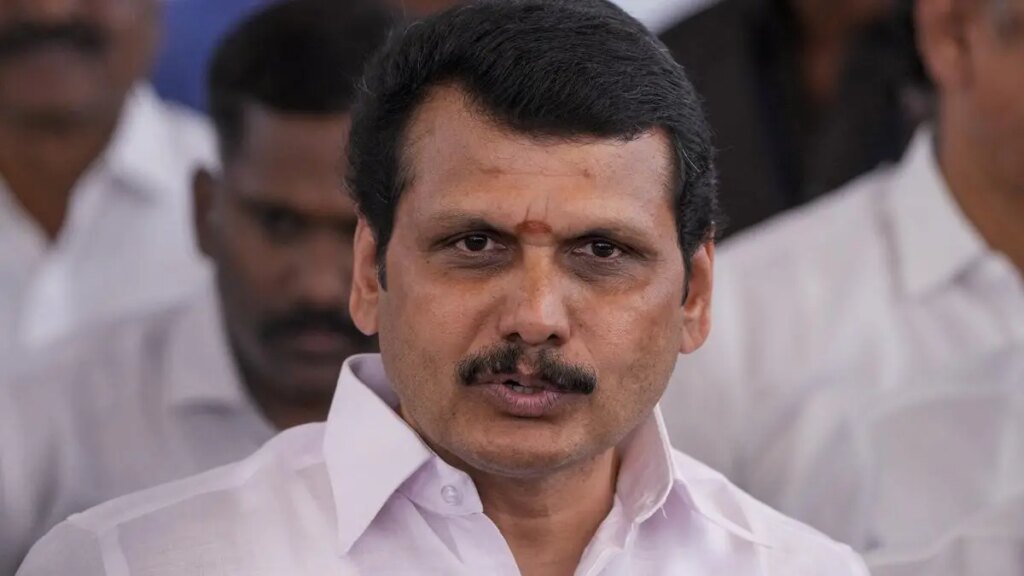
Tamil Nadu Minister V.Senthilbalaji addresses the media during the first day of the Tamil Nadu Budget session at Fort St. George, in Chennai, on March 14, 2025.
| Photo Credit: PTI
The Supreme Court’s offer of bail to Tamil Nadu’s Power Minister V. Senthilbalaji—conditional on his resigning from the Cabinet—has sparked debate over fundamental questions of probity in public office and the individual rights guaranteed under Article 21 of the Indian Constitution, amid ongoing money laundering proceedings by the Enforcement Directorate (ED) in a cash-for-jobs case.
On September 26, 2024, a two-member bench of Justice Abhay Oka and Justice Augustine George Masih of Supreme Court granted bail to Balaji, citing the “inordinate delay in the conclusion of the trial” as the main reason. Balaji, by then, had spent 471 days in prison. The court also observed that his time in custody could end up exceeding a substantial portion of the sentence he might receive, if convicted.
Just three days after his release on bail, on September 29, 2024, he was re-inducted into the Tamil Nadu Cabinet—a move that raised eyebrows and sparked intense debate over legal and ethical norms. The possibility of his bail being revoked has also remained a point of contention.
The order granting him bail, however, served a message to the prosecuting agency, the ED, that it cannot detain somebody indefinitely, whether under the Prevention of Money Laundering Act (PMLA) or under the provisions of any other law.
Also Read | Supreme Court champions bail reform. But will lower courts listen?
While granting bail to Manish Sisodia, a former Minister in the AAP government in Delhi in the excise policy case, the Supreme Court had observed: “It is high time that the trial courts and the High Courts recognized the principle that ‘bail is the rule and jail is the exception’.”
Setting aside an Orissa High Court order in another case on March 22, 2024, a two-member bench of the Supreme Court had also ruled that ordering a politician on bail to refrain from taking part in political activities as a condition for the grant of bail would be a violation of fundamental rights.
Bail or jail?
In Balaji’s case too the Bench followed the same jurisprudential dictum: “Bail is the rule and jail is the exception.” However, it did not shy away from imposing stringent bail conditions on Balaji, given that the seriousness of the case outweighed other legal considerations. He was required to execute a Rs.25 lakh bond, surrender his passport, respond to ED summons, cooperate with the court, and—above all—maintain no communication whatsoever with witnesses and victims. The court also ordered the registration of additional charges under the Prevention of Corruption Act, 1988, to be clubbed with the existing cases against him.
But the ED alleged murky developments in the Chennai trial court after V. Senthilbalaji was re-inducted as a minister, and urged the Supreme Court to cancel his bail. An independent petitioner also sought cancellation of the bail. In February this year, the ED told the Court that Balaji had been deliberately delaying the trial and making it difficult for the agency to produce witnesses. It argued that his influence as a minister had deterred key witnesses from testifying—an act it described as a “blatant disregard for the Supreme Court’s instructions”.
In response, Balaji filed an affidavit questioning the bona fides of the petitioner and dismissing the ED’s concerns. He asserted that participating in public life was his “cherished right” under Article 21, and argued that since the case could take years to conclude, he should not be barred from serving the public. He also maintained that he had not violated any bail conditions.
The Supreme Court, however, was not convinced. On April 23, a Bench of Justices A.S. Oka and Ujjal Bhuyan expressed strong displeasure. Justice Oka remarked that granting bail had been a “mistake”, noting that Balaji was not a minister at the time. The bail, he said, had been granted on grounds of personal liberty under Article 21, not on the merits of the case. The Court described Balaji’s conduct as “dishonest”. “There is something wrong,” the Bench observed. “We grant bail, and the next day you go and become a minister? What is going on?”
Also Read | With interim bail for Arvind Kejriwal, Supreme Court balances legal process with democratic principles
Balaji’s counsels—senior advocates Kapil Sibal, Mukul Rohatgi, and Ram Shankar—urged the Bench not to pass any adverse orders until April 29. In a rare move, the Supreme Court gave Balaji a stark choice: remain free on bail or continue as a minister—an extraordinary order by any court, let alone the apex court.
Balaji now has little choice but to resign—if only to spare Chief Minister M.K. Stalin further embarrassment. There are already reports that Stalin may drop a few senior ministers and bring in new faces into the Cabinet as his government gears up for Assembly polls that are just 14 months away.
However, it is concerning that stripping Balaji of his ministerial responsibilities is being considered more as a political manoeuvre than as a matter of principle. And the fact that the court had to intervene and act firmly highlights a troubling reality: political convenience often takes precedence over integrity and accountability—values that are essential to a healthy democracy.
Source:https://frontline.thehindu.com/news/supreme-court-senthilbalaji-bail-enforcement-directorate-money-laundering/article69491073.ece

